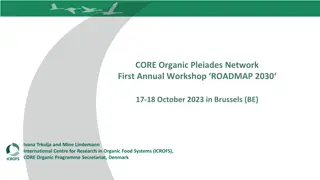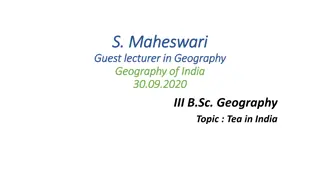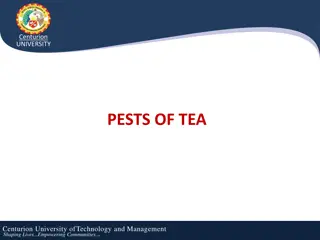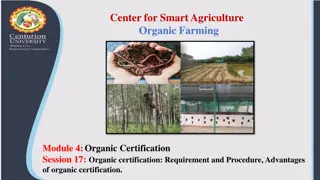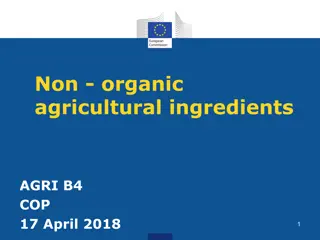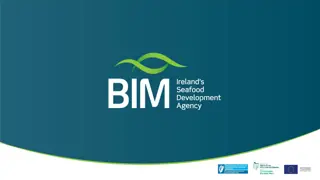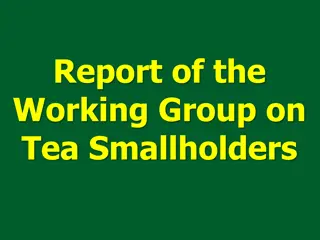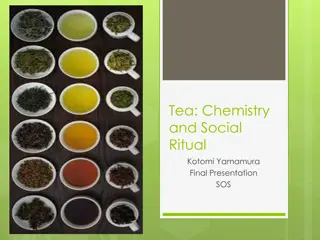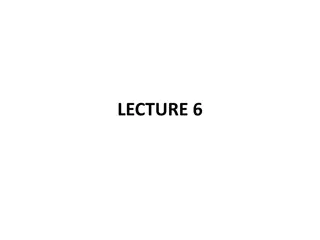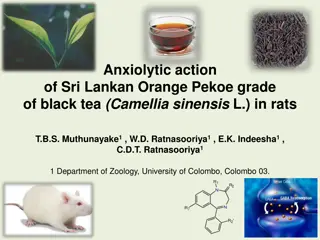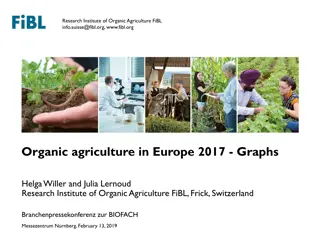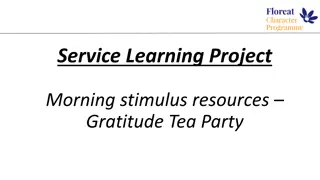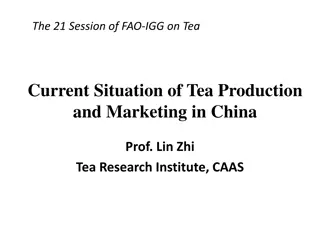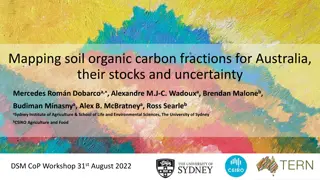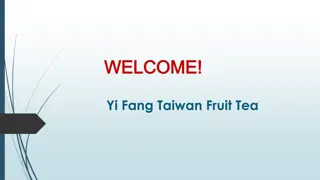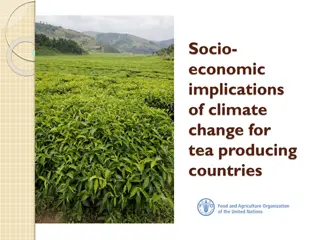Report of Working Group on Organic Tea: Recommendations & Tasks Assigned
The Working Group on Organic Tea, consisting of members from India, China, Bangladesh, Japan, and Sri Lanka, was tasked with generating market information, developing strategies, outlining technical requirements, and certifying tea production. The group recommended collaboration for market data collection and sharing technical standards developed in China and India. Additionally, they suggested aligning certification processes with national standards to facilitate exports.
Download Presentation

Please find below an Image/Link to download the presentation.
The content on the website is provided AS IS for your information and personal use only. It may not be sold, licensed, or shared on other websites without obtaining consent from the author.If you encounter any issues during the download, it is possible that the publisher has removed the file from their server.
You are allowed to download the files provided on this website for personal or commercial use, subject to the condition that they are used lawfully. All files are the property of their respective owners.
The content on the website is provided AS IS for your information and personal use only. It may not be sold, licensed, or shared on other websites without obtaining consent from the author.
E N D
Presentation Transcript
Report of the Working Group on Organic Tea Members of the working Group: India, China, Bangladesh, Japan, Sri Lanka This working Group was constituted by IGG Tea during its 20thSession held on Jan 30 1 Feb, 2012 in Colombo, Sri Lanka
Tasks assigned to the Working Group Tasks assigned to the Working Group 1. Generate market info & Develop market strategies 2.Technical requirements 3.Certification processes for tea production 4. Collect and share info on production, package of practice, R &D 5.Consider organic tea as low energy input for financial gain through carbon trading &Join the organic movement for sustainability the Working Group deliberated the on the above issues during two inter-sessional meetings held in September, 2012 in Washington Dc USA, and May 2014 in FAO HQ s in Rome
The Working Group deliberated on the tasks assigned to it during two inter-sessional meetings held 1. September, 2012 in Washington Dc USA, and 2. May 2014 in FAO HQ Rome
Recommendations of the Working Group Recommendations of the Working Group 1. Generation of market information & Development of market strategies Given the difficulties in collection of market info from various countries, the WG recommends that this exercise be undertaken by the IGG-Tea Secretariat in collaboration with the member countries.
Recommendations of the Working Group Recommendations of the Working Group 2.Technical requirements Technical requirements The technical requirements have been sufficiently codified under the CFC funded projects - in China and India. China submitted its report for green tea in 2012. India, submitted its report for Black tea in April 2014 The technical requirements as recommended in the report of India & China could be made available to the member countries for adoption with suitable adjustments suiting to the local conditions.
Recommendations of the Working Group Recommendations of the Working Group 3.Certification processes for tea production Certification processes for tea production The WG having recognized that several developed countries have put in place their own National Standards for organic agriculture, recommends that IGG-Secretariat may collate common features of such National Standards and the same be made available to organic tea producing counties for enabling them to align their standards in order to gain equivalency in the importing countries.
Pr 3.1Certification processes for organic agriculture in India Certification processes for organic agriculture in India In order to provide a focused and well directed development of organic agriculture and quality products -a National Programme for Organic Production (NPOP) has been notified by Govt. of India under the Foreign Trade and Development Act. The NPOP provides information on standards of organic production, systems criteria and procedure for accreditation of inspecting and certifying bodies, the national organic logo and the regulations governing its use. The standards and procedures have been formulated in harmony with international standards and keeping Indian requirements in mind.
Pr 3.1.Certification processes for organic agriculture in India Certification processes for organic agriculture in India The Indian NPOP standards for production and accreditation system have been recognized by European Commission and Switzerland as equivalent to their country standards. USDA has recognized NPOP conformity assessment procedures of accreditation as equivalent to that of US. With these recognitions, Indian organic products duly certified by the accredited certification bodies of India are accepted by the importing countries. In India, Agricultural and Processed Food Products Export Development Authority (www.apeda.gov.in) is the nodal agency for regulating the certification of organic products as per National Standards for Organic Production. Based on NPOP standards, certification agencies inspect and certify organic farms and organic food products. The performance of the certification agencies is closely monitored to ensures that the certified organic products are genuine and that consumers get the best worth of it.
P Current status of organic agriculture in India Current status of organic agriculture in India Currently, India ranks 10th among the top ten countries in terms of cultivable land under organic certification. The total area under organic certification in 2012-13 was 5.21 million hectare comprising 0.50 million hectare of cultivable area and the rest 4.71 million hectare of forest and wild area for collection of minor forest produces. Around 1.34 million MT of certified organic products were produced during 2012-13 which included all varieties of food products namely Sugarcane, Cotton, Basmati rice, Pulses, Tea, Spices, Coffee, Oil Seeds, Fruits and their value added products. India exported 135 products during 2012-13 valued around 374 million US $ to EU, US, Switzerland, Canada, South East Asian countries and South Africa. Organic Tea constituted 2% of the total organic products exported in 2012-13.
Recommendations of the Working Group Recommendations of the Working Group 4.Collect and share info on production, package of practice, R&D 4.Collect and share info on production, package of practice, R&D Under the CFC project, package of practices for green and black tea have been developed with R & D support from TRIs. The package of practices could be made available to member countries for adoption with suitable adjustments suiting to their local conditions. Current status of production of black organic tea in India(2013) No. of. Certified organic teagardens: 77 up by 24 from 2007 Area under organic tea in Ha: 15726 up by 5518 ha from 2007 Production of organic tea in million kg: 11 up by 3.5 m.kg from 2007 China in 2011 : Area 45000 ha ; Production:35 million kg
Experience in India Only 1% of the total tea produced in India is Organic tea Production is gaining momentum in the small sector Crop loss is a major challenge- up to 40% reduction after conversion to organic High cost of Production mainly due to more man days required when compared to non organic tea (more than 60%) Price not rewarding the the additional effort put in Consumers are not prepared to pay more than 20-40% (survey report on India) and not more than 1.5 times of regular tea price
Declining Yield trend observed in organic gardens before and after conversion : Yield kg made tea per hectare Before conversion 2548 2023 2160 2486 3226 2297 2507 2025 2337 After % of Estates Area in ha. conversion 1312 1318 819 1125 2285 1135 1621 1468 1302 reduction 48.5 34.8 62.1 54.7 29.2 50.6 35.3 27.5 44.3 A B C D E F G H 245.36 245.00 143.00 105.01 43.60 213.00 188.00 86.00 1269 Average
ORGANIC Vs NON ORGANIC TEA ORGANIC Vs NON ORGANIC TEA Cost per ha and kg of tea in South India In INR Cost per ha and kg of tea in South India In INR Inorganic Organic S.no Cost component Cost per kg Cost per kg 35.41 1 Total variable cost 77.66 16.62 2 Total fixed cost 34.15 24.50 3 Manufacturing cost 24.50 16.00 4 overhead expenses 16.67 92.53 Total Cost 152.98 % increase over Non organic 65%
Recommendations of the Working Group Recommendations of the Working Group 5&6 Consider organic tea as low energy input for financial gain through carbon 5&6 Consider organic tea as low energy input for financial gain through carbon trading and join the organic movement for sustainability trading and join the organic movement for sustainability TRI CAAS is focussing on two critical issues 1.Carbon sequestration in organic tea soils and its quantification 2.Mitigation of green house gases emission in organic tea fields compared to the conventional ones and its quantification The results indicate that the carbon sequestered in the organic soil is one percent more annually than the non organic soil. Further research work is ongoing to calculate carbon credit and low carbon certification regulation under organic management.
Way forward Way forward Given the limitations observed with regard to conversion of non organic tea plantations to organic gardens crop reduction and high cost of cultivation owing to increase man days requirement the working group felt that to begin with it may be worthwhile to encourage the non organic gardens to adopt green farming methods - gradual reduction of chemical fertilizers and supplementing with organic manures and reduction of pesticide load by adopting IPM (Integrated Pest Management) practices so that the usage of pesticides could be phased out gradually. the marketing issues could be dealt with by the Working group on Trade and Quality with the assistance from IGG-Tea Secretariat and the Task force on Statistics may monitor the organic tea demand world over.



